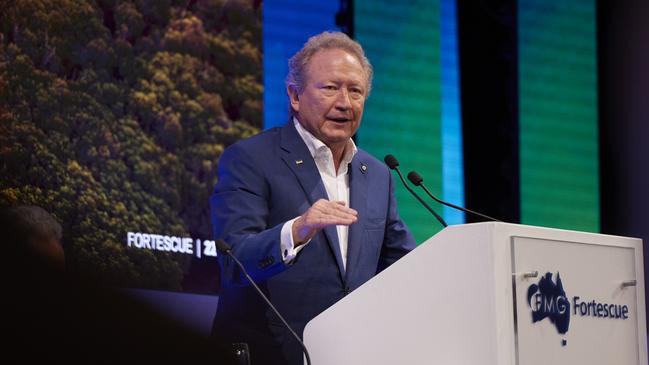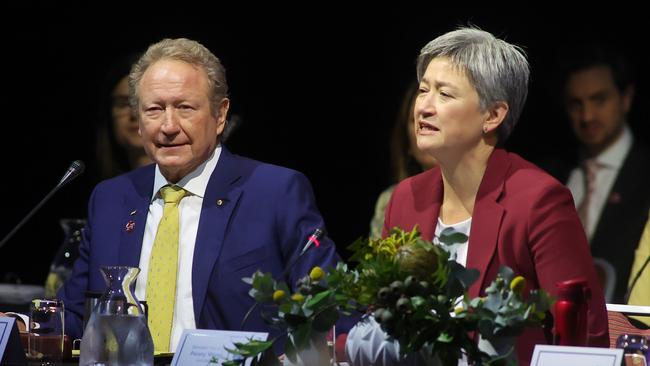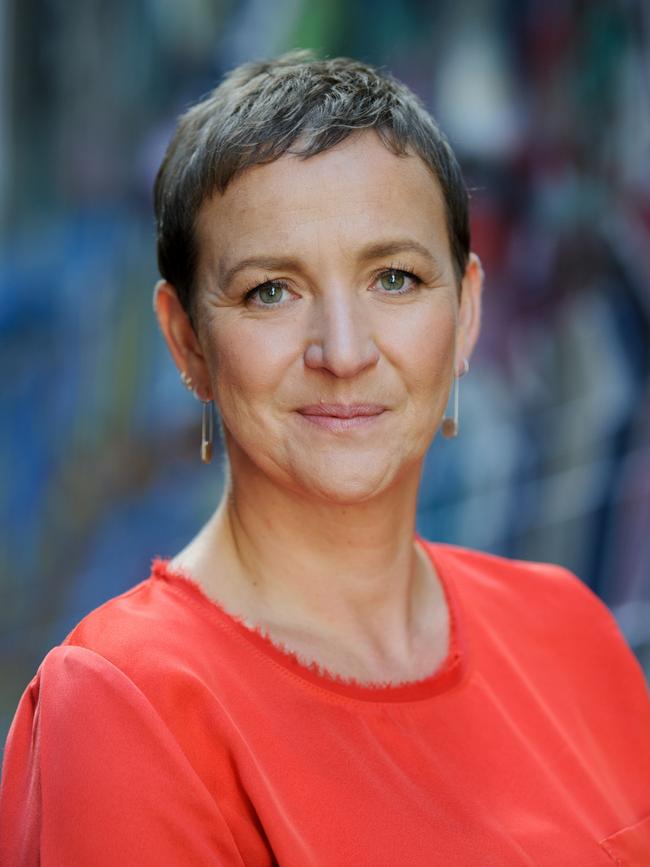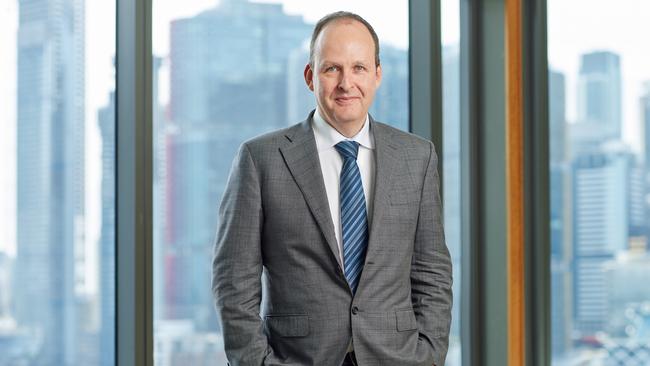Twiggy’s press attack smacks of Palmer histrionics; Capgemini exits Adelaide Festival

Andrew Forrest’s war on The West Australian newspaper and his great bellowing over its coverage of Fortescue Metals Group smacks of all the histrionics we’ve come to expect of another stout billionaire: Clive Palmer.
No surprise then that Twiggy has taken a leaf out of Palmer’s book and purchased full page ads targeting The West on Thursday, including in these very pages.
The ad, lurid in a concerning shade of red, menaced the reader with tear-outs of The West’s headline coverage and taunted the paper’s editors with the punchline: “Don’t be hooked by headline trash.”

It was bad, but not as bad as the ads repeatedly taken out by Palmer during last year’s federal election; in them Palmer spruiked the credentials of political candidate Craig Kelly, calling him “our next prime minister” in text that ran above an enormous photo of his rubicund face.
Perhaps nothing will ever be as ill-conceived as that $100m of spending. Confusingly, we hear Twiggy tried to purchase full-page ads in The West Australian this week, an attempt that was obviously going to be unsuccessful.
That’s a shame, really, because three of the headlines he was hoping to smear concerned an alleged cover-up of sexual harassment at Fortescue, pursued by the paper’s journalists. Those allegations are now subject to a formal inquiry by WorksafeWA, hardly the realm of “headline trash”.
Then again, if Twiggy is so enraged with The West’s coverage he could probably just buy the paper with a bid for its parent company, Seven West Media.
Kerry Stokes owns just under 40 per cent, and given SWM was worth in the ballpark of $635m on Thursday, Forrest could conceivably lob an offer with a 30 per cent premium and still spend less than $500m. It’s an offer that would barely touch the sides of the $850m Fortescue dividend paid last week.
Stokes might even have to throw in a controlling bid.
Sponsor pulls plug on Adelaide Festival
French multinational Capgemini is the latest to withdraw its sponsorship of the Adelaide Festival as pressure builds over its platforming of two writers known for their visceral brand of antisemitism and routine attacks on Jews online.
The IT services company pulled support for the festival, beginning on March 3, after organisers programmed appearances by novelists Mohammed El-Kurd and Susan Abulhawa at its upcoming Writers’ Week.
There’s little need to republish El-Kurd’s loathsome remarks, which we’ve printed already, but the gist of his commentary includes the deranged assertion that Jews spend appreciable amounts of time harvesting the organs of Palestinians and carry an “unquenchable thirst” for their blood.

Margin Call revealed on Tuesday that law firm MinterEllison, a major sponsor of the Adelaide Festival, had quietly resolved to minimise its brand presence at the festival’s forthcoming events and distance itself entirely from the Writers’ Week.
Capgemini ignored requests for comment but festival CEO Kath Mainland confirmed to Margin Call the company had ended its sponsorship arrangement, saying she sympathised with any other partners weighing a similar course of action. The Australian is a supporter of the Adelaide Festival as a presenting partner of the Kronos string quartet but does not have a sponsorship role in the writers’ week.
“Capgemini have let us know that they will no longer be a sponsor of Adelaide Festival, which is disappointing,” Mainland said.
“We know this is an emotive topic that is garnering lots of attention. If sponsors or donors are not comfortable with our programming and choose to remove their support, we completely understand and respect their choice to do so.
That being said, we’re encouraged by the conversations we have had.”
Still unresolved are the ambiguous positions of some Festival partners, particularly those expending great amounts of energy signalling their commitments to workplace inclusivity. Presumably that means disassociating from events that amplify rabid antisemites.
PwC Australia, the festival’s auditor, has remained in a pitiful state of paralysis over how to manage its partnership with the Festival; it’s received a deluge of complaints over the proposed speaker line-up, including from some clients.
One solution would be to condemn the remarks, much like South Australian Premier Peter Malinauskas did this week. “I completely abhor the comments that have been made,” he said.
“I’m surprised they (the speakers) are being facilitated at Adelaide Writers’ Week. I won’t be going along to hear them speak.”
As of Thursday, PwC has made no statement and its senior partner, Jamie Briggs, an ex-federal minister, hasn’t even bothered replying to a letter of concern sent by Jeremy Leibler, a partner at Arnold Bloch Leibler and Zionist Federation of Australia president.
Fee-fest at Star
The Star, now run by ex-Tyro boss Robbie Cooke and remarkably still chaired by Ben Heap, has declared a $1.2bn loss and has to raise $800m in fresh equity to keep the wolves from the door.
But every cloud has a silver lining and here the big winners out of The Star’s need for a balance sheet fill-up are – no prize for guessing – the investment bankers.
While long suffering shareholders ponder suspended dividends, the sustained decline in the value of their shares and now dilution, the folks at Barrenjoey and Macquarie are reaping in the fees as both lead managers and underwriters to the casino’s raising.

Margin Call’s back of the envelope calculations reveal the two firms will share north of $14m for their work on the life- saving deal, which excludes the $80m being tipped in by Chow Tai Fook and Far East Consortium.
Fine print to the deal reveals that based on a $720m raising, the banks will get $3m each as lead managers (a fee of 0.75 per cent), plus underwriting fees of $4.14m each (a fee of 1.15 per cent), for a combined take of $7.14m each. Total fees for the two banks amount to $14.28m.
Oh happy days.
To be fair that money comes with a lot of risk, with underwriters obliged to take up any shortfall that may eventuate in The Star’s stock.
The retail component of the offer alone will be 35 per cent of Star’s new total shares on issue, so that Macquarie and Barrenjoey could theoretically be left with more than a 10 per cent stake in the casino group, which is beyond the threshold requiring probity clearance from the NSW gaming regulator. Wouldn’t the likes of Brian Benari and Shemara Wikramanayake relish jumping through those hoops?
Billionaire pub baron Bruce Mathieson, who’s said to have amassed a 4 per stake in The Star and indicated plans to go to 9.9 per cent, doesn’t appear to want to jump through them either.


